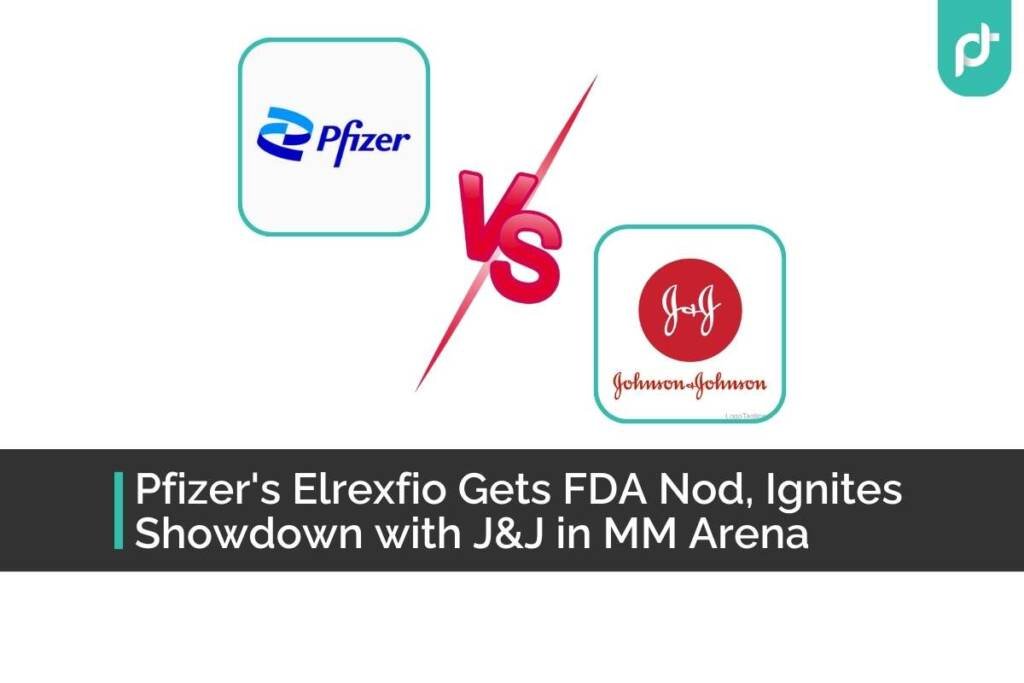Pfizer’s latest BCMA-targeted drug, Elrexfio (elranatamab), has gained FDA approval for treating multiple myeloma patients who have undergone at least four prior lines of therapy. This puts Elrexfio in direct competition with Johnson & Johnson’s Tecvayli, both of which are bispecific antibodies harnessing T cells to combat BCMA-expressing cancer cells. Notably, both drugs are administered subcutaneously.
Comparing their efficacy data, Elrexfio and Tecvayli exhibit similar results. However, Elrexfio has an edge in terms of convenience, being dosed every other week after 24 weeks of weekly treatment, compared to Tecvayli’s weekly dosing during maintenance. The cost of these treatments reflects their effectiveness, with Elrexfio priced at an average monthly list price of $41,500 and Tecvayli at $39,500 per month.
Clinical trials have demonstrated the positive impact of Elrexfio. In the Phase II MagnetisMM-3 study, Elrexfio shrank tumors in 58% of patients who had undergone a minimum of four prior lines of therapy. Updated data in June revealed a 61% objective response rate, with 35% achieving a complete response or better. Notably, none of these patients had been treated with a BCMA-directed therapy prior to the study.
On the other hand, Tecvayli, as showcased in the MajesTEC-1 trial, exhibited an overall response rate of 63%, with 45% achieving complete responses or better. This data included patients who had undergone three prior lines of therapy.
While Pfizer’s Elrexfio and Johnson & Johnson’s Tecvayli are rivals in the BCMA bispecific space, Johnson & Johnson holds a stronger presence in the multiple myeloma field. J&J’s Darzalex is a leading CD38 antibody for front-line myeloma treatment, and its BCMA CAR-T drug, Carvykti, has demonstrated impressive efficacy. Additionally, J&J’s FDA-approved Talvey, a bispecific antibody targeting GPRC5D, offers promising tumor shrinkage ability and biweekly dosing.
Elrexfio represents Pfizer’s primary myeloma product, in contrast to J&J’s broader portfolio. Pfizer’s acquisition of Seagen, valued at $43 billion, includes a BCMA-directed antibody named SEA-BCMA. However, this candidate recently exited Seagen’s clinical development pipeline.
While Elrexfio gained accelerated approval, Pfizer is committed to validating its benefits through further trials. The Phase III MagnetisMM-5 trial will provide conclusive evidence for Elrexfio in patients who have undergone two classes of medicines. Pfizer is also conducting the MagnetisMM-7 study, exploring Elrexfio as a maintenance treatment in newly diagnosed patients after transplantation.
Both Elrexfio and Tecvayli are subject to an FDA-mandated safety program due to the risk of cytokine release syndrome (CRS) and neurotoxicity. In Tecvayli’s trial, CRS occurred in 72% of patients, with 0.6% experiencing grade 3 CRS. In Elrexfio’s trial, the rate of grade 3 CRS was 2.3%, as of the June update.





























